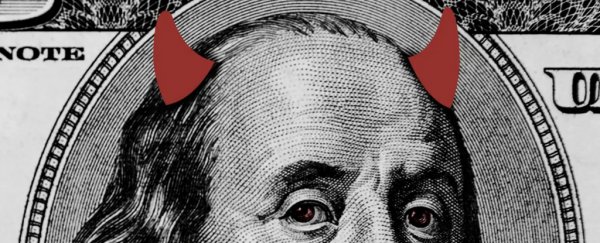What is about money that makes people do bad things?
It seems a fair question when the news is dominated by misdeeds of the rich and powerful. The Paul Manafort trial, now entering its third week, has revealed details of his alleged crimes: defrauding banks out of tens of millions of dollars, evading taxes by stashing huge sums in offshore accounts and using riches earned through unregistered work for foreign governments to buy $15,000 ostrich and python jackets.
Manafort's deputy Rick Gates testified about the small fortune he embezzled and spent on his globe-trotting infidelities.
Also last week, Rep. Chris Collins (R-N.Y.) was charged with insider trading. Scandals have shown Trump's Cabinet members flouting government rules and ethics for private jet rides, $31,000 dining table sets, $43,000 soundproof booths and questionable business trips abroad.
"To researchers who study wealth and power, it's dismaying but not surprising, because it tracks so closely with our findings. The effect of power is sadly one of the most reliable laws of human behavior," said Dacher Keltner, a psychologist at the University of California at Berkeley who has spent decades studying wealth, power and privilege.
Six years ago, Keltner and a then-graduate student in his lab, Paul Piff, published influential innovative experiments that confirmed many of our worst assumptions about the rich and the corrupting power of wealth.
In one experiment, the researchers stationed themselves at a busy intersection with four-way stop signs and tracked the model of every car whose driver cut off others instead of waiting their turn. People driving expensive cars — like a brand-new Mercedes — were four times more likely to ignore right-of-way laws than those in cheap cars like an old beat-up Honda.
"It told us that there's something about wealth and privilege that makes you feel like you're above the law, that allows you to treat others like they don't exist," Keltner said.
Next, they had a researcher play a pedestrian trying to cross at a crosswalk and tracked which cars stopped as the law requires and which blew right past him. The results were even more stark.
Every one of the cheapest cars stopped, while half of the expensive cars ignored the pedestrian in the crosswalk — many even after making eye contact.
There have been warnings throughout the ages about the corrupting effects of wealth and power. Buddha, for example, gave up the rich life of a prince for enlightenment. Jesus warned his disciples a camel would have an easier time squeezing through the eye of a needle than a rich man trying to get into God's kingdom.
Rapper Biggie Smalls reached a similar conclusion before his untimely death: "Mo money, Mo problems."
In the past few decades, a growing body of psychology research has tried to capture and measure the exact effects of wealth on behavior and morality.
That research has shown the rich cheat more on their taxes. They cheat more on their romantic partners. The wealthy and better-educated are more likely to shoplift. They are more likely to cheat at games of chance. They are often less empathetic. In studies of charitable giving, it is often the lower-income households that donate higher proportions of their income than middle-class and many upper-income folk.
In one of the more surprising findings from their 2015 paper, Keltner and Piff found the rich are more likely to literally take candy from children. In that experiment, they first asked 129 subjects to compare their finances with people who had either more or less money.
Then they gave their subjects a jar of candy and told them the sweets were intended for children in a nearby lab but they could take some if they wanted. Those who felt richer after comparing their finances to poorer people took significantly more candy for themselves.
The findings build on similar research in recent years that suggests wealth and power strip people of their inhibitions, increase risk taking and feelings of entitlement and invulnerability. At the same time, power makes people less empathetic and able to see others' perspectives.
"Wealth is basically a mechanism for power, and power has a freeing effect on people. It takes away the constraints of society and frees people to act according to their dominant desires," said Adam Galinsky of Columbia Business School, whose experiments have explored how power often propels people's actions.
In some cases, those desires may be altruistic or helpful to society, so power heightens those goals and can give rise to effective philanthropists. Often, however, power leads to self-serving behaviors unrestrained by the usual concerns over rules or the consequences for others.
Because much of the psychological research into wealth and power is relatively new, many of the findings are still being tested and need to be confirmed by replication, researchers say.
"I wouldn't say these questions are settled. There are disagreements about the exact effect of wealth and ethics and how large the effect is," said Michael Kraus, a social psychologist at Yale's School of Management.
But the research has never seen such booming interest and momentum — with growing inequality in America and a multimillionaire born into wealth in the White House.
"There's a lot of reasons we should care about the ethics of wealthy people," Kraus said.
"Even if research found that they were no more unethical as anyone else, their influence on the world is so much greater. If someone like me steals something, it only affects only a handful of people. But if someone like Manafort steals or lies or cheats, it affects so many more people. There are foreign governments and banks involved. You start getting into that area where it can affect the whole country and the course of democracy."
2018 © The Washington Post
This article was originally published by The Washington Post.
Science AF is ScienceAlert's new editorial section where we explore society's most complex problems using science, sanity and humor.
